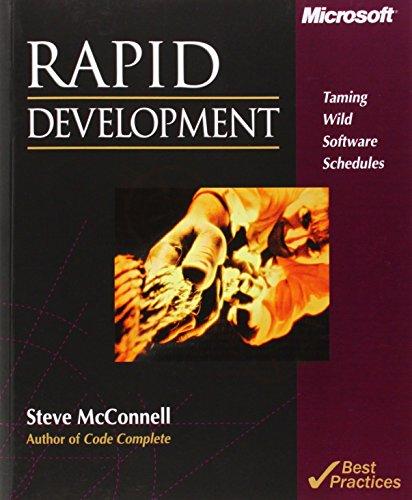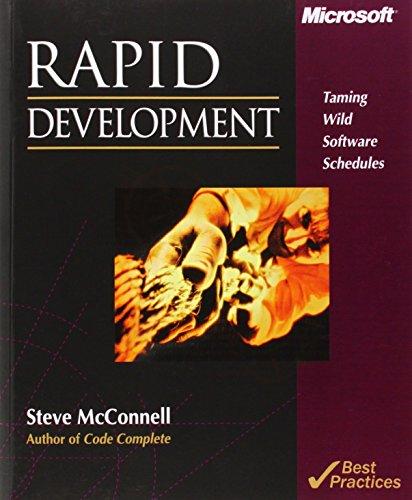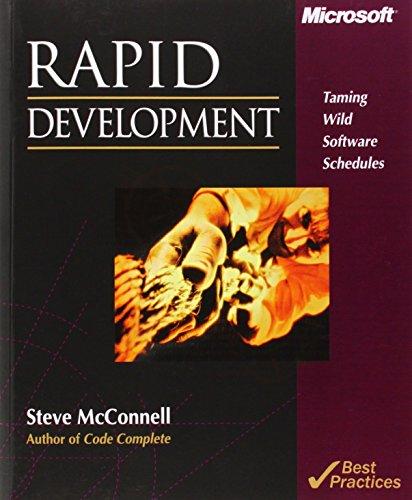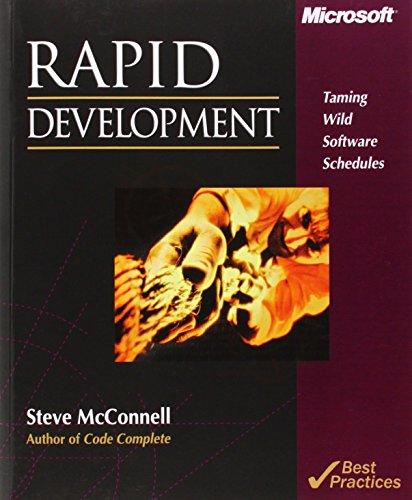
Exploring ‘Rapid Development’: A Review of Software Scheduling
In our exploration of “Rapid Development: Taming Wild Software Schedules,” we found the book to be an insightful resource for software professionals grappling with the complexities of project timelines. The authors provide a comprehensive framework that addresses common scheduling pitfalls, emphasizing practical strategies to streamline development processes. We appreciated the use of real-world examples, which illustrated how teams can effectively manage their time and resources. The clear structure and actionable advice make it accessible for both seasoned developers and newcomers alike. While some sections delve deeply into theoretical concepts, we felt these were balanced by pragmatic tips that could be implemented immediately. Overall, “Rapid Development” serves as a valuable guide for any team looking to enhance their scheduling practices and improve project outcomes.

Our Review of Rapid Development: Taming Wild Software Schedules
In this review, we delve into “Rapid Development: Taming Wild Software Schedules,” a guide authored by Steve McConnell that aims to address the complexities of software project management. The book offers practical insights into improving project timelines and managing resources more effectively. We found the structured approach and actionable strategies particularly useful for teams facing tight deadlines and unpredictable scheduling challenges. McConnell emphasizes the importance of establishing clear objectives and iterative processes, which resonates well with our experiences in software development. His case studies and real-world examples provide relatable context, making theory easier to apply. Overall, “Rapid Development” serves as a valuable resource for anyone looking to refine their project management skills in software development.

Exploring ‘Mastering Productivity With SCRUM’: Our Review
In our exploration of “Mastering Productivity With SCRUM: A Comprehensive Guide to Success,” we found that the book provides a thorough introduction to SCRUM principles and practices, making it accessible for both novices and experienced practitioners. The structured approach outlined in each chapter presents a clear framework for implementing SCRUM effectively within various team environments. We appreciated the use of real-life case studies, which illustrate the practical application of theoretical concepts, enhancing our understanding of the methodology’s impact on productivity. However, while the guide is comprehensive, some sections could benefit from more visual aids to facilitate learning. Overall, we believe this book serves as a valuable resource for anyone looking to improve their project management skills using SCRUM, providing both foundational knowledge and practical strategies for success.

Exploring ‘Mastering Productivity With SCRUM’: Our In-Depth Review
In our exploration of “Mastering Productivity With SCRUM: A Comprehensive Guide to Success,” we found a resource that effectively delineates the principles and practices of the SCRUM methodology. The book stands out for its clarity, breaking down complex concepts into digestible sections that are easy to follow for both newcomers and seasoned practitioners. Each chapter provides practical examples and actionable insights, making it a valuable tool for teams looking to enhance their productivity and collaboration. We appreciated the inclusion of real-world case studies that illustrate SCRUM in action, thereby reinforcing its relevance across various industries. While the authors present a thorough overview, some sections could benefit from deeper insights into common challenges faced during SCRUM implementation. Overall, this guide serves as a solid reference that could help organizations streamline their processes and achieve greater success in their projects.

Evaluating ‘Rapid Development’: A Tool for Software Scheduling
In our exploration of software development methodologies, we found “Rapid Development: Taming Wild Software Schedules” to be a compelling resource. This book provides a comprehensive framework for managing tight timelines and navigating the complexities of scheduling in software projects. The authors present practical insights grounded in real-world experience, which we found valuable for both seasoned professionals and those new to software development.
One standout feature is the emphasis on agile principles, which encourages adaptive planning and iterative progress. Throughout the chapters, we appreciated the clear structure and illustrative case studies that enhance understanding. However, some sections felt overly prescriptive, which may not resonate with all readers. Overall, “Rapid Development” serves as a useful tool for teams aiming to streamline their development processes and achieve timely delivery without sacrificing quality.

Evaluating ‘Rapid Development’: Insights on Software Scheduling
In our exploration of “Rapid Development: Taming Wild Software Schedules,” we found the book to be a comprehensive guide that addresses the challenges of software project timelines. The authors provide a plethora of strategies for managing and optimizing schedules, offering insights drawn from their extensive industry experience. We appreciate the practical examples and case studies that illustrate the concepts, making them accessible for both novice and seasoned developers. The emphasis on iterative development and responsive planning resonates with our belief in agile methodologies. However, some sections may feel overly technical for readers who are less familiar with project management terminology. Overall, “Rapid Development” serves as a valuable resource for those looking to enhance their software scheduling processes and achieve more predictable delivery outcomes.
